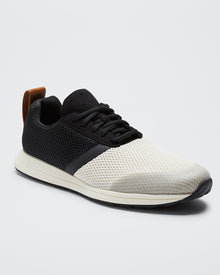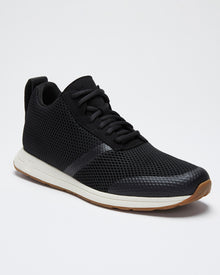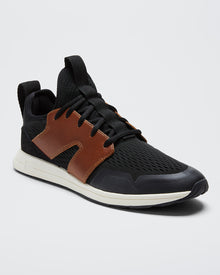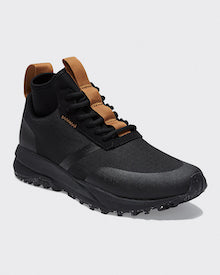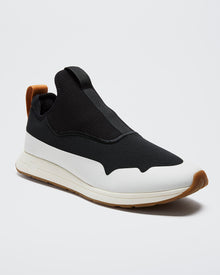08.17.17Bold Apps
This season’s theme, “Smells Like Team Spirit,” was inspired by the power of training with a tight knit crew. We shot part of our brand campaign at Ultimate Self Defense in Boston with the Rajasi Muay Thai team, as this band of outsiders are incredible examples of dedication, hard work, and a fighting spirit.
Their coach, Xavier Ramos, trained in Thailand and tries to teach his team what he learned, from physical training to the Wai Khru ceremony to preparing mentally for a fight. We talked to Coach Xavi about Muay Thai fight tradition and how he trains and develops his fighters in this week’s Out of Step journal…

YORK: How did you get started in Muay Thai?
XAVI: I used to be a pro wrestler, and in my last show I got paralyzed so I decided to do something else. I started training in MMA and then I fell in love with Muay Thai and just stuck with that.
YORK: Where did you get your start in Muay Thai and who were your trainers?
XAVI: I started with Stephen Strotmeyer at Khaay Muay Sit-Kangmongkorn / Pittsburg Muay Thai, and Matee Jedeepitak who is a Thai trainer. Matee, he’s from Thailand, he was Lumpinee Stadium Champion for 5 years and is considered one of the best fighters of all time. He trained Stephen, who started at the age of 30. He’s also a Ph.D. He's an epidemiologist. He runs the science department at the University of Pittsburgh. He has more of a scientific base to his training, whereas Matee is more of the old school, Thai style of training. So I was able to get both sides, which is why I teach the way I do.
YORK: Can you talk about Thailand and your experience over there? How long were you there, who did you train with, and how was it different than training in the States?
XAVI: I went over to Jitti Gym in Bangkok in 2008 and was there for about two months. I trained six days a week, twice a day and went to fights almost every day. It was different because I went by myself, so I didn’t have friends, but I loved it because I got to focus on my training and my self. I didn't go to Thailand for the sights. I went there to train and that’s all I really did. It was fun.
YORK: Do you think going to Thailand is an important part of Muay Thai training?
XAVI: Yes. It’s not necessary, but if you want to be serious about it, you have to go over there. You have to understand what you're doing and where it comes from. A lot of versions of Muay Thai here [in the States] are karate people who add a move here and there and call it Muay Thai. But you don't really understand what you're doing and why you’re doing it until you see the Thais doing it. So to me, if you're going to be serious in this sport, you need to make at least one trip to Thailand.
YORK: What does Muay Thai mean to the people in Thailand?
XAVI: Muay Thai is their national sport. It's their baseball. It’s their soccer. That's what they do. There are fights every day of the week. There is a lot of gambling, a lot of drinking. It’s very weird though, because fighters are considered lower class -- they still have the class system over there. So if you're a fighter, you are considered of a lower class, which is why Muay Thai isn’t quite like the other traditional martial arts, because essentially, you’re fighting to feed your family. It's not like here where people do it for fun or for exercise; they do it because they have no choice. Sometimes that 8-year-old you see fighting is the one making all the money for his family because maybe his mom is a farmer, and she’s injured, and now she can't work, and his dad died and now they can’t provide for their family. So they need to send their 8-year-old to be a fighter to make money. That's how it goes. And it's still like that.

YORK: Can you expand on how training in Thailand is different from training in the United States?
XAVI: It's a little bit more intense for sure, but I would say that the actual fights are especially different. Fighting, for them, is a business, so they don't take them personally. It's not like an ego thing-- they want to get in safe, get out safe, make their money, feed their family and move onto the next flight. In contrast, sometimes when it's the last round here, both fighters go extra hard because they take the fight so personally, and it's their identity. In Thailand, the fighters might not go so hard the last round, or sometimes they will just call the fight because they both have to fight the next week, and they both have to make money for their families. Another main difference is definitely the scoring. Scoring is supposed to be about balance and technique. Elbows and knees score the highest, and then kicks score if you move them, and then punches score the least. Here and in Europe, or anywhere in the Western World, punches score more because of the influence from boxing. They know boxing better than they know Muay Thai, so if they see three punches, they will score that higher than if they see one kick, but in reality, the one kick would be worth more in Thailand.
YORK: What role does religion play in Muay Thai in Thailand?
XAVI: There would always be a little shrine outside the gym with various things like flowers and figurines, just like any other Buddhist shrine. They clean it every day, but they don’t expect foreigners to participate in any of that because they understand it’s not part of their culture or faith. The Mongkon [traditional head piece] is also kind of like that, but it is more of a fighting tradition than a religious tradition. You have to remember that not everyone in Thailand is Buddhist. There are Muslims, Hindus, and Christians. But they all engage in the fighting traditions. Most of the traditions are influenced by Buddhism because it is primarily a Buddhist country, but they are not necessarily Buddhist.
YORK: Can you talk about the Mongkon and the uniform that fighters wear when they walk out to the ring?
XAVI: First off, you put on the Pra Jiad, which is what you put on your arm. Back in the day, those were usually just a piece of Monk’s robe, cut off and blessed before putting it on the fighter. This was from wartime, before it became sport, and that was supposed to keep them safe when they went into battle. And essentially the Mongkon is the same thing. But now, there is usually one for each gym because it is supposed to hold the fighting spirit of all the members of your gym. So when you put it on, you can’t go under anything or let it touch the ground. You have to go over the ropes, and hang it up when it’s not being used. Then there is the Garland, which is flowers, a gift usually given to the fighter by their family.
YORK: What is the significance of the Wai Khru Ram Muay?
XAVI: “Wai” means bow, “Khru” means teacher, “Ram” means dance, and “Muay” means boxing. So you are doing a dance to show respect to your god, your country, and your teacher. Every gym has their own dance. Now there is a lot off overlap because of YouTube, and there is a lot of inter-training between gyms. Back in the day, it wasn’t like that. It used to be that everyone stayed at their gym, but today, even in Thailand, fighters are free agents, and often fight out of different gyms.

YORK: Let’s talk about the physical preparation. How is Muay Thai preparation different than preparation for other sports or other martial arts?
XAVI: I would say it depends on the kind of gym you come from. If you come from a hard gym, you’re going to train hard. If you come from a non-competition based gym, you’re not going to train as hard. I would say the one thing with Muay Thai is that we're much more into the hard body training. Hitting everything full blast and always hitting with power, whereas other martial arts focus more on the more peaceful side of martial arts. They're calm and relaxed, but Muay Thai is not calm and relaxed; it’s chaos. You have to learn to be comfortable in the uncomfortable.

YORK: Let’s break down training a little bit. How do you warm up?
XAVI: In the morning session, we usually get up by 6am, drink a bottle of water and go run for about an hour and some change. Then we come back, drink another bottle of water, hit the pads for 20-30 minutes and do bag work from another 20-30 minutes. Then it depends on what the trainers want you to do; they change it up.
In the afternoon session, we would train at 3pm. We’d start off 1/2 hour jumping rope, ½ hour shadow boxing, 1/2 hour of pad work, 1/2 hour of bag work, 1/2 hour of sparring, 1/2 hour of clinching, and then whatever the trainers want you to do.

YORK: As the head coach at Rajasi Muay Thai Camp, how do you individualize training for different fighters?
XAVI: The main thing I look at is personality. What kind of personality do you have? And what is your fighting personality? Some people want to move back; some people want to move forward; some people want to be flashy; some people want to be rough and tough.
In terms of the technique, the techniques are all the same: a kick is a kick, a punch is a punch. There is no secret. If you throw it right, you throw it right. But if someone is more aggressive, maybe I will have them working more on forward movement, and cutting off the ring, and clinching, because eventually, if you are aggressive enough, you will end up in the clinch. If you want to be a slick fighter, then we might work more on footwork, angles, slipping, and counters. But at the end of the day, the techniques are the same – it’s the personalities that are different. It also depends on who you’re fighting. That plays a role in how we train. If your opponent is taller, I will have you get on the inside; if your opponent is shorter, I will let you stay outside. If someone wants to move, I want them to feel uncomfortable and not move. If they want to clinch, I want them to keep out of the clinch. I want them to do whatever it is they don’t want to do so they get more comfortable with it.

YORK: What do you think is the hardest mental barrier for fighters to break through?
XAVI: The fear of failing. That is what paralyzes people. Instead of just being in the moment, they fear what other people think about them, or what they're doing, or how they're performing. Instead of just enjoying the moment and having fun.
YORK: How do you prepare for fear?
XAVI: That’s the thing, you can’t really prepare for it. I can tell you how to breathe or what to visualize, but at the end of the day, some people have it or they don’t. That’s why not everyone can fight. It’s personality. Are you one of those people who look at an obstacle and tries to find a solution, or are you going to let the obstacle break you? No matter how physically prepared you are, at the end of the day, fighting is 95% mental. I see so many people who are in great shape, but then they go out there and break or just don’t perform to their potential. That’s usually in their own head.
YORK: How do you know if a fighter is mentally prepared?
XAVI: I beat their ass. [haha]
YORK: Do you have any mental rituals that help you stay focused and prepare you to fight?
XAVI: I believe in visualizing what you want to do and visualizing your game plan. But I also visualize getting my ass kicked and learning to come back from that. If I’m going on a run, and running sprints, the sprints suck. So I visualize that is what I’m going to feel like as I’m getting beat up, and I have to recover and go at it again. I feel like so many people visualize the good parts and nobody visualizes getting their ass kicked, but that’s what is going to happen, and that is part of the fight. So it’s important to learn how to get your ass kicked, then relaxing, then coming back. That’s how I prepare. But not everybody is like that. Some people cant handle the negativity.

YORK: The Rajasi team name. Where does that come from?
XAVI: Rajasi is from Thai mythology. It is a fire lion, the king of all beasts. It is Khaay Muay Rajasi.
The Rajasi Muay Thai team trains at Ultimate Self Defense & Performance Center in South Boston. For more information, check out their websites:
Photo credit: Leonard Greco Photography
Special thanks to Becca Moore for helping to prepare this interview.
